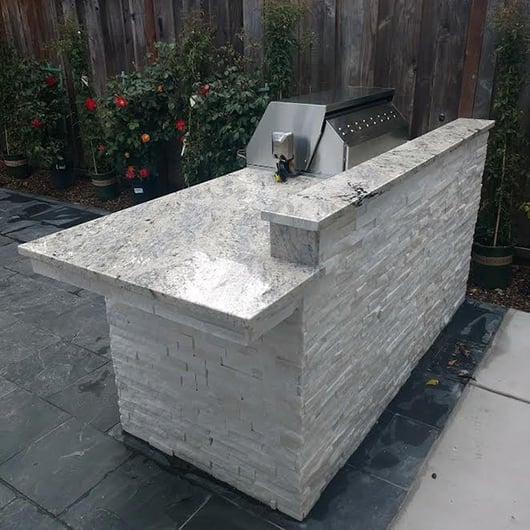 When you invest in an outdoor kitchen, you want to keep it clean and beautiful for years to come. We’ve already covered keeping your grill grates clean and cleaning and maintaining your fire pit, so this week we’re going to look at cleaning your countertops.
When you invest in an outdoor kitchen, you want to keep it clean and beautiful for years to come. We’ve already covered keeping your grill grates clean and cleaning and maintaining your fire pit, so this week we’re going to look at cleaning your countertops.
Here’s a quick guide to special cleaning requirements for the most common types of outdoor kitchen countertops:
Cleaning granite countertops
When your contractors installed your outdoor kitchen’s granite countertop, they most likely gave you instructions about how to keep it clean. Most granite kitchen surfaces have a sealant applied, and you should have been instructed on how to maintain this as well. (If Unlimited Outdoor Kitchen installed your kitchen and you can’t remember some of the details, feel free to contact us and ask for clarification!)
That being said, granite countertops only need very simple cleaning from time to time:
- First, use a soft cloth to gently remove any pollen, dust, or other abrasive substances.
- Then get a bucket of hot, soapy water, and wipe down with a cloth or soft-bristled brush.
- Wipe down again with water to remove soap residue.
Need something a little stronger?
- Fill a spray bottle with a 1:1 ratio of water and isopropyl alcohol.
- Spray onto your countertop and let sit 3 to 5 minutes.
- Rinse with water and dry with a clean cloth.
For particularly tough stains:
- Use baking soda and add enough water to make a paste.
- Apply the paste to the stain and let sit for a day.
- Gently remove the paste with water and a clean cloth.
Do not use bleach-, ammonia-, or acid-based cleaners (including citrus acids) on granite, as these can eat away at the sealant and even damage the granite itself.
Have a different kind of stone finish? Check out this comprehensive guide by the Spruce for specific details on cleaning other types of stone countertops.
Read On >> Caring for Outdoor Granite Countertops
Cleaning concrete countertops
If you have a sealed concrete countertop, you’ll want to avoid ammonia, vinegar, lemon juice, and any other acid-based cleaners. Acids can eat away at the sealant and even permanently stain the concrete itself.
As with granite, soap and water is your best bet for cleaning concrete. Avoid using abrasive scouring pads, as this can scratch the sealant and/or the concrete itself.
If you notice a stain, it’s important to determine its origin to know how to treat it:
- If it’s an acid-based stain, it may require the concrete to be re-buffed to remove the damaged section. (So be careful when cutting up citrus fruit or other acidic foods!)
- If the stain is from condiments, coffee, etc., a cotton ball with a little bit of bleach can be left on the surface for a few minutes
- If it’s an oil stain, you may need to create a poultice to draw the oil out. Because concrete is porous, a surface cleaning won’t get to the root of the problem. Follow these instructions from the experts at Concrete Network for creating a stain-removing poultice.
You may also need to re-seal your concrete countertop from time to time. Talk to your contractor about how often this should be done.
Cleaning tile kitchen countertops
Tile grout can be especially difficult to clean—because grout is porous, it’s susceptible to staining as food spills, pollen, tree sap, and more seep in and get trapped.
Cleaning tile grout requires a bit of work to physically scrub it. Use a nylon scrubbing brush with good, stiff bristles. Don’t use steel bristles that can chip grout away or scratch the surface of the tile. A toothbrush can work, but it’s since it’s small and relatively soft-bristled, it will take a lot more work and won’t get the same results.
As for cleaners, use caution. If you have colored grout, talk to your kitchen designer about the best methods for cleaning without discoloring it.
For white grout, cleaning options include:
- Commercial grout cleaners. Do your homework and use sparingly, as some of these can be environmentally harmful.
- Oxygen bleach (a non-toxic alternative to chlorine bleach). Dilute in water according to package instructions, leave on for 5 minutes, and then scrub and rinse away.
- A paste made of baking soda and water. Leave on overnight and rinse with hot water the next day.
- A paste made of 3 parts baking soda, 1 part hydrogen peroxide, and a squirt of dish soap. Apply to the grout with a brush, wait a few minutes, and rinse with hot water.
Don’t use vinegar or other acids, since these can actually eat away at the grout and can even damage the tiles themselves. Of course, NEVER mix chlorine bleach and ammonia products, since these can create dangerous fumes.
After cleaning, you may also want to apply a grout sealer to prevent further staining. This should be re-applied periodically.
Have more questions?
We hope this quick guide has pointed you in the right direction. If you have more questions, or want help picking out the ideal countertop for your new outdoor kitchen, the design experts at Unlimited Outdoor Kitchen would be glad to help! Give us a call at (650) 279-6506, or contact us online.

